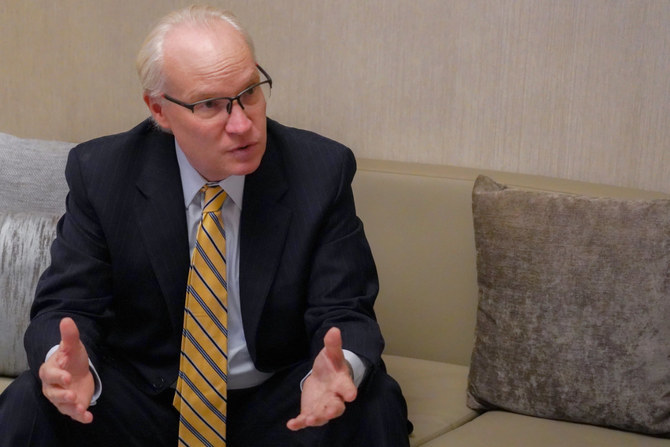
- ARAB NEWS
- 04 Jul 2025

CHICAGO: Despite painting a broadly optimistic picture of advances in the peace process in Yemen over the past 18 months, including the April 2022 truce agreement between nation’s government and the Houthis, the US special envoy to the country, Tim Lenderking, said the path forward remains “difficult and challenging.”
Following the recent restoration of diplomatic ties between Saudi Arabia and Iran, the latter of which backs and provides arms to the Houthis, the world “needs to see follow through on the commitments Iran has made” on Yemen, he added.
Lenderking, who returned this week from an official trip to the Middle East for talks on Yemen, was speaking on Wednesday during an online briefing hosted by the US State Department.
“We do feel that any measures regional countries take to deescalate tensions in the region will be of benefit to the region, and that is certainly the case in the Yemen conflict,” he said.
“What we need to see is Iran follow through on the commitments that were made to Saudi Arabia: No smuggling of lethal equipment or war equipment into Yemen to the Houthis, and a commitment to support a political resolution of the conflict.”
The war in Yemen began in 2014 when the Houthis, insurgents backed by Iran, seized the capital Sanaa. The conflict spread and has fueled cross-border violence. Iran and the Coalition to Restore Legitimacy in Yemen negotiated a two-month truce in April 2022, which was extended twice and continues to offer hope for a more permanent settlement, even though it expired in October last year.
“Yemen has witnessed the longest period of deescalations since the war began,” Lenderking said. “Thousands of lives have been saved. Cross-border attacks and airstrikes have stopped. Freedom of movement has been improved, including with the resumption of commercial flights from Saana Airport for the first time since 2016.
“That said, much more is needed. Only a Yemeni-Yemeni political agreement can durably resolve this civil conflict. And only a comprehensive recovery and reconstruction effort with strong support from regional, as well as international, donors can reverse the humanitarian and economic crisis facing Yemenis every single day.”
Furthering stressing the positive developments, he added: “We remain optimistic about the prospects for further progress for peace … That is why we and others in the international community are urging the Houthis to seize this unprecedented opportunity to sit down with the Republic of Yemen government to chart a better future for Yemen.”
Lenderking concluded his briefing by saying “I will just reiterate the sense of promise and possibility that we are feeling” but added that at “the same time (what) we are seeing inside Yemen is a difficult and challenging situation.”
He said there are four main aspects to the ongoing negotiations, which are commitments not to carry out cross-border attacks; to expand commercial capacity at Sanaa Airport; to implement a “strong, significant reduction in bureaucratic process for moving oil and other commercial humanitarian supplies into Yemen;” and to do more to facilitate the payment of salaries to Yemeni public-sector workers who have gone without pay since the conflict began.
Lenderking also took a moment to praise the UN-led salvage operation to remove more than 1.1 million barrels of oil from the decaying Safer oil tanker. The vessel has been moored in the Red Sea off
the coast of Yemen, near Hodeidah, since the conflict began, with little or no maintenance during that time, sparking growing fears of an environmental catastrophe.
“While the work on the Safer is not yet finished — the decaying ship still needs to be towed and scrapped — the immediate crisis, (the threat of) an oil spill four times that of the Exxon Valdez (disaster off the coast of Alaska in 1989), has been averted.”
However, he added that the UN needs an additional $22 million in funding to complete the scrapping of the Safer.